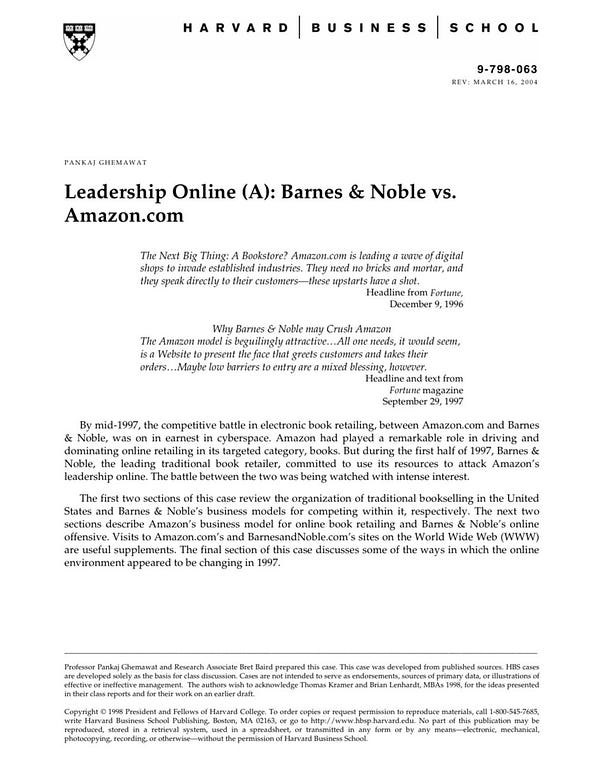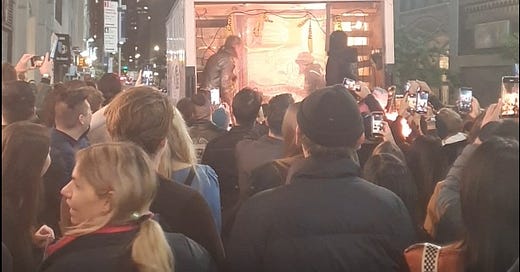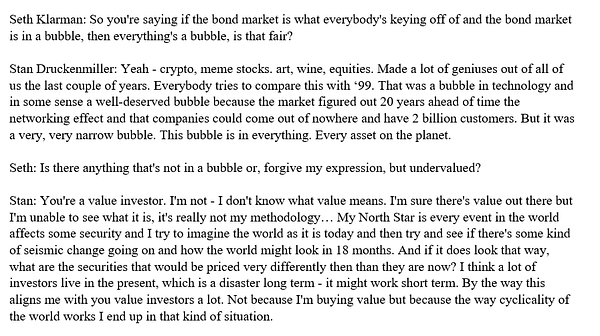Workshop Note: A Weird Initiation
"In our world, the successful people are the ones who are able to do the creating and are able to push into the world." Marc Andreessen
Hi All.
This past week, I injected some randomness into my life and attended an event related to NFT NYC (“The Leading Annual Non‑Fungible Token Event”) hosted by a DAO I am involved in. Mario wrote the ultimate guide to DAOs; I think about it as a group of people organized around a common objective with shared ownership of the outcome and the ability to allocate resources based on a crypto treasury. Somewhere in between a company, a cooperative, and a social club.
I continue to struggle with what crypto really means beyond enabling 24/7 global speculation. I wrote in the past about being confused by the lack of real-world applications (beyond trading and storing wealth) but that the asset seemed lindy (it refused to die) and memetic (keeps spreading and drawing more people and capital into the space). NFTs however do solve a problem. By making digital goods scarce and ownable, value can accrue to creator. It should be a boon to digital artists.
Unfortunately, it seems that right now the appeal of an NFT is primarily driven by its potential for price appreciation. And a dedicated artists faces competition from a flood of projects and a compelling aesthetic may not be sufficient to gain attention. Still, I’m intrigued by the idea and what it could become.
Which is why I found myself at a gallery space in Midtown, surrounded by a crowd of crypto enthusiasts, entrepreneurs, and artists. While a variety of digital artwork was projected on the walls, the highlight of the night was a strange performance of smashing, banging, breaking, and yelling.
One of the people involved in the event was the anonymous performance artist SHL0MS who rose to fame this summer by smashing a toilet and selling pictures of the shards as NFTs (a riff on Marcel Duchamp’s Fountain). In a riff on SHL0MS’s work, a banged up truck pulled up in front of the gallery and guests were greeted by a leather-clad, pig-tailed maniac and his fire throwing, trombone playing friend. We were invited to pick up a steel pipe and smash a variety of items to pieces inside, including computer screens, and, yes, a toilet seat.
But what does it mean? Does it mean anything? Was this just a fever dream of the nouveaux crypto riche?
Forget all the details. Forget the toilets.
How do you draw people into your new world? How do you turn them into believers who will spread the idea?
You make them part of a memorable shared experience, an initiation ritual. You make them feel special: “you’re early, you’re innovative, you’ve discovered a secret before others. You’re one of us now.” You let them become part of the story.
In 2013, Chris Dixon wrote “what the smartest people do on the weekend is what everyone else will do during the week in ten years.” But it’s not enough though to spend the weekend in a garage working on the new thing. You also have to “inject yourself into the world” as Marc Andressen said.
“The world is busy. People already have stuff going on. People don’t wake up in the morning and say, “God, I can’t wait until I find out what this person I’ve never heard of in California has invented. Like, that’s not how the world works — you have to inject yourself into the world. And so in our world, the successful people are the ones who are able to do the creating and are able to then kind of push into the world — Steve Jobs put a ding in the universe — the people who are actually willing to carry the idea forward, and proselytize it, and evangelize it, and argue it, and advocate for it, and make sure people see it, and make sure it succeeds.”
People in the crypto space seem to be very good at pushing their vision and projects out into the world. Sure, it is self-serving: anyone heavily invested in the idea wants more adoption. But at least it was fun, energizing, and creative in a raw and unashamed way.
I came away energized, stirred up. I still don’t know what it all means. I’m not convinced that any particular NFT or project will be valuable in the long run. But I don’t see how we ever revert the idea that digital goods can be scarce, ownable, and worth something. And if they can be worth something, then a select few can be worth a lot.
Crypto’s message is fun, weird, and effective. It sells the idea that you too can become part of the small group of enlightened beings who deserve to get rich by virtue of being early and at the right place. And as a general rule, I’d rather bet on effective marketing than against it. But I’m not going to forget what I saw written between the lines: the ecstasy of a group of newly rich, having escaped the squid game by being early, online, open-minded, and risk-seeking. Flush with treasure, they’re eager to inject their ideas into the real world.
Leaving the desk and books behind to chase randomness and learn about something new was very much in the spirit of The Reading Obsession which became my most read piece ever - thank you all so much for reading and sharing! Honestly, I was worried about angry mail. Instead, it seems to have hit a nerve and even invited a bit of discussion in the comments and on Twitter. Let me be clear: I’m not arguing against reading at all (I still need an audience to read my stuff😉).
I was trying to make two points. First, when studying people like Warren Buffett we often face a mythology that distracts us from the real drivers of their success (see also Predators to Icons). We must not only look behind the curtain (“do as they do, not as they say”), we also have to put a quote into the context of the different stages of a career (“…do as they did”).
And secondly, don’t try to out-read your competition. Yes, read a lot. But recognize the declining marginal benefit if reading comes at the expense of leveraging your knowledge through others. A networked thinker who reads a lot will do better than an isolated thinker who reads obsessively. This seems especially true as markets become more competitive and efficient. Qualitative insights become more important and can’t be gleaned from financials (think business models, competitive advantages, leadership, culture).
Which brings me to my first piece on Bill Miller which is supposed to serve as an illustration that adapting your strategy to a changing world can be a formidable challenge. There is no one eureka moment but instead a sequence of small steps of discovery.
Miller became one biggest outside investors in Amazon. His learning journey included his investment in Dell as a case study, joining the Santa Fe Institute and finding insights in many other disciplines, talking to company executives, and mingling with venture capitalists. He kept accumulating pieces to a mosaic to understand “the underlying economic reality of the business” which was obscured by accounting. The picture revealed a company that “old Miller,” like many of his value peers, would have rejected as a possible investment.
I could be quite close-minded and dismissive of ideas that fell outside of my frameworks. At one of my old firms we were LPs in a small venture fund that became one of the earliest investors in Robinhood. “Trading for free? That’s nuts! How could that kind of company be worth a lot of money? Must be the late stages of a bull market,” is what went through my head. I don’t blame myself for not understanding how Robinhood could become so successful. You don’t have to play every game or understand every business model. But I blame myself for not trying harder to understand, for failing to maintain an intensely curious and open mind at that time. I shied away from the discomfort of learning and that is a mortal sin in investing and life.
Miller didn’t reinvent value investing. But he figured out how to integrate the principles of value and the companies of the internet age much earlier than others. And while his initial investment in Amazon was too early, and accompanied by much criticism from his tribe, his robust scaffolding of insights allowed him to maintain conviction and average down. That’s very different from jumping into a bubble at the last moment because of FOMO. (Coincidentally, his embrace of averaging down (“lowest cost wins”) also led to disaster which I will discuss in a second piece.)
Thankfully, we don’t have to travel as much as Buffett did, nor do we have to run up outrageous phone bills. The internet has collapsed distances and it is much easier to build important new relationships remotely. Meeting in person is still valuable and important. But much of the groundwork can be done by learning (sharing) in public, in Twitter DMs, on Discord, via email, and on zoom calls.
I wonder if this would be the perfect environment for a young Buffett. Able to remove himself from inbound noise by moving to Omaha where, as Philo pointed out “by default the majority of your time will be thinking and reading” and groupthink would be less of a danger. And he would be able to connect with and investigate much of the world remotely at near zero cost. Then again, the internet itself presents such a distraction that a young Buffett might spend a lot of time making memes rather than learning about businesses. Either way, I doubt he would be investing in digital toilet shards.
Bubble.
“This bubble is in everything. Every asset on the planet.”
“I'm sure there's value out there but I'm unable to see what it is.”
“I try to imagine the world as it is and see if there's some kind of seismic change going on. A lot of investors live in the present, which is a disaster long term.” Stanley Druckenmiller
Future.
“Think of how the future will be different from the past. Most people default to the directions and trends that they are currently observing… The important thing is that most things change. In longer term projections, Peter Bernstein tells us, that cone of uncertainty gets wider as time goes out. What are the chances that IBM will be bankrupt tomorrow morning? Probably none. A year from now? Five years from now? What about one hundred years from now? The point being that the possibilities increase as time goes out. So, what you are trying to do as an investor is exploit the fact that fewer things will happen than can happen. So, you are trying to figure out how that probability distribution works and stay in the middle of what will happen. The market has to worry about all the things that can happen.” Bill Miller
Books.
I’ve switched from mostly listening to podcasts to balancing it with audio books via the Libby app which provides access to my local library. I’ve been listening to Is This Something by Jerry Seinfeld, a walk through his old notebooks filled with jokes mixed with a few reflections on his life as a comedian. While not all jokes have aged well (I barely remember answering machines?!) some of the chapters are so funny that I look like an idiot walking down the street, giggling under my headphones.
Which got me wondering: why isn’t that a thing, standup podcasts. I’m not talking about shows with comedians talking but either standup routines or loose selections of shorter jokes in a podcast format. Does anyone have recommendations?
Also got my first advance copy for a book I’m going to review when it gets published in early 2022. An unexpected benefit of writing in public that I’m super excited about (a free book! can you imagine?!).
I also tweeted my highlights from the footnotes of More Money Than God, my favorite book on the history of hedge funds and hands down one of the best researched books in finance. Per a reader’s suggestion, perhaps it’s worth putting together a book list in the future.
Podcast.
Staying on the topic of comedy, check out Infinite Loops with Rory Sutherland on “Effective Communication: Jesters & Saints.”
“As people are educated in a more and more homogeneous way, the gains to specificity and accuracy that you enjoy, and the gains to certainty, are offset in a way because everybody shares the same blind spots.”
“And there seems to be just as there was a court, this role of jester who was the one person allowed to insult the king as a necessary corrective. There seems also to be an evolutionary mechanism, where we accept that you can say things in a funny way and the social response to that has to be different to if they are said seriously.”
History.
“The Amazon of 1997 was not the Amazon of today. Frankly speaking, it was a much weaker, much less defensible business. For early stage companies, you're not really betting on a business as it is. You're betting on a business as it *could* be.”
Corey shares amazing insights into the history of technology, especially the early days of the internet and of great software companies.
“In 1997, Amazon was 3 years old and generated $148M in sales, entirely in the book industry. Barnes and Noble was 26 years old and was 15x bigger, at $2.5B in sales.
In contrast to the vertically-integrated Amazon of today, the Amazon of 1997 held little inventory and relied on its wholesaler Ingram to ship 59% of its books In other words: in 1997, Amazon was really just an outsourced website layer built atop an Ingram warehouse…”


Essay.
On Cards, Crypto, and Christ
Powerful and raw essay about triumph, failure, and the search for meaning and love. You don’t have to arrive at the same conclusion to appreciate this journey and vulnerability. At many points I found myself nodding along - yep, been there, yeah, tried that.
“For most of my adult life, I’d felt somewhat like a modern leper, a degenerate gambler on the outskirts of society, unable to form real or meaningful relationships. The tears were a purifying cleansing, a personal release of my broken messy past and stepping anew into the things God had for me.”
Architecture.
Now there’s a building I’d go back to the office for!





Also check out this interview with Atlassian co-founder Mike Cannon-Brookes.
"A founder’s three roles:
-Culture and Storytelling
-People and Hiring
-Promoting and Killing New Things
My number one job in the area of creation and innovation is to find new, exciting things and protect them so that they have a chance to succeed."
Enjoyed this piece? Let me know by hitting the ❤ like button.👇 Thank you!
If you enjoy my work, please consider sharing it with friends who might be interested. It would mean a lot to me to reach (and teach) more people. 🙏






